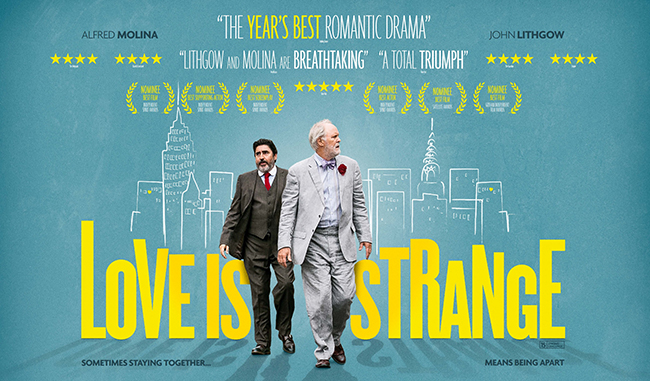
Love Is Strange Review
Love isn’t strange. Or at least it doesn’t seem that way for the two protagonists of Ira Sachs’ wonderful film.
For Ben (John Lithgow) and George (Alfred Molina) love is finally getting married after 39 years together. Love is – as we find out – completely knowing the other, even the things you would not want to know about any other person. It is forgiving past indiscretions and having gotten so used to a person being there that sleeping alone becomes a challenge. Love could be as simple as just wanting to spend the rest of your life bickering, fussing and chatting to the person closest to you. Yet, of course, it isn’t.
Shortly after marrying Ben, George gets fired from his job as a Catholic school music teacher. Everyone knew that George was gay all along but now that marriage has made it official, the archdiocese is putting the proverbial foot down. George and Ben are forced to sell their New York flat and move in – separately – with friends and family. It is then that audiences witness the strangeness of love, but it isn’t Ben and George’s love that is strange, it is the love of everybody else. Friends and family truly appreciate Ben and George, not least as a role model for a working relationship, but clearly that appreciation was never meant to stand the test of having them move in. Forced to share a bunk-bed with his teenage great-nephew Joey (Charlie Tahan – amazing!), Ben witnesses more than he would like of the fissures in the relationships between Joey and his parents Elliot (Darren Burrows) and work-from-home novelist Kate (Marisa Tomei) who tries to cope with Ben’s invasion of her living and workspace as best she can. Meanwhile, George is crashing on the sofa of a much younger gay couple whose endless nights of partying, gaming and Game of Thrones take their toll on his emotional resilience. Through the relationships of the people surrounding Ben and George, Love is Strange explores different faces and facets of love and life together. This is love in a very real context, faced with the challenges of advanced age, sudden joblessness and a tough real estate market.
There is no stagy directing here. Love is Strange shines through the performances of its two outstanding leads. Sachs gives the actors the freedom to breathe life into their parts and Molina and Lithgow create pure magic. The idea that these two people have been together for the better part of their lives is as completely believable as the intimacy and tenderness between them. They are, in many ways, the archetypal old married couple – in the most endearing possible way. Which only enhances the sense of unfamiliarity when they are torn apart and away from the life and places they are used to. Marisa Tomei and Charlie Tahan in particular add further outstanding performances, and Sachs isn’t shy to dwell on the quiet and profoundly emotional moments.
The witty and charming script, co-written by Sachs and Mauricio Zacharias is wonderful too in its respectful and tender approach to its subject. Camera and sets work together to create an authentic, lived-in world, painted in powerful images and beautiful colours but without any unnecessary embellishment that would just draw attention away from the central themes so beautifully enhanced by the Chopin-filled soundtrack.
Love is Strange is outstanding. Cinema simply needs more films like this.
Anne Korn

